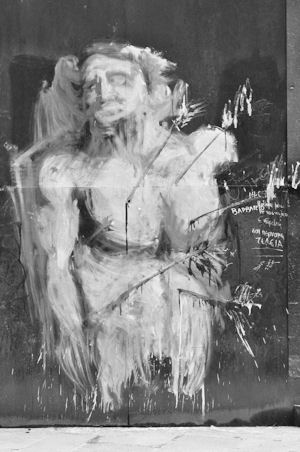 At night my father and I sit outside watching moths fly around the bare front door light. Beyond the porch is the warm summer blackness of the mountains. Lights from the infrequent cars on the highway can’t penetrate this envelope of darkness, as if the entire universe were lit by this one dangling bulb. For the moths, this is an absolute truth. They flutter on silent wings like drunks, banging into the house, porch posts, the small overhang that shelters our front door.
At night my father and I sit outside watching moths fly around the bare front door light. Beyond the porch is the warm summer blackness of the mountains. Lights from the infrequent cars on the highway can’t penetrate this envelope of darkness, as if the entire universe were lit by this one dangling bulb. For the moths, this is an absolute truth. They flutter on silent wings like drunks, banging into the house, porch posts, the small overhang that shelters our front door.
One night a giant moth plants itself like a mollusk on the door. Body fat as my father’s thumb, wingspan as big as my head, it seems impossible. I can see the feathered antennae, watch it press into the door, trying to seem like some small deformity in the wood. I stretch up my fingers to touch it. I know about magic flying dust on the wings of butterflies and moths and how touching them takes the magic away. My mother and father have given me this lesson many times. But this moth is too big to be real. Like doubting Thomas, I need to touch it to believe in it. I stretch up onto my tip-toes, but can’t reach it. So much of being a child is the exercise of reaching for things that are out of reach. My father lifts me up under my arms to dangle me in front of the giant moth as he begins the familiar lesson of dusty wings.
We watch for a long time, me hanging there like a side of beef, until the moth pushes off into flight. It bumps hard against my father’s arm, which sends it into a spin. The moth lands with a dull thud onto the concrete patio. We stand staring at the fallen insect. My head filled with anxious questions?will it die without the magic dust? Did we kill it? I twist round to look at my father’s face for answers. The wing dust rests like mother’s baking flour on his red woolen shirt sleeve, an imprint of lost magic.
My father never spoke in moments like that. He left me alone on the porch, the creak of the screen door, the hard bang against the door jamb, said what he could not: this I can’t fix
—
Rebecca Fish Ewan’s upbringing from age five by her single-father, Peter Fish, cultivated the heart of her storytelling and sense of the world. She is the author of the creative nonfiction book A Land Between, an exploration of the eco-cultural history of the Owens Valley, California. She is a professor of landscape architecture at Arizona State University where she also earned an MFA in creative writing. Her work focuses on the relationship between human beings and the landscape, and how that connection is expressed through place-making and the arts.
Photo by Dinty W. Moore

6 comments
Spencer Luck says:
Aug 17, 2020
Spencer Luck
We watch it for a long time, me hanging there like a side of beef, until the moth pushes off into the light.
Spencer Luck says:
Aug 17, 2020
I feel that the theme of the story is the decisions that people make effect other people, animals or insects.
Spencer Luck says:
Aug 17, 2020
The tone at first started calm and then it turned serious
Spencer Luck says:
Aug 17, 2020
My father never spoke in moments like that. He left me alone on the porch, the creak of the screen door, the hard bang against the door jamb, said what he could not: this I can’t fix
This resonates with me because it has to do with me when I was a lot younger. I used to break, damage and do things out of curiosity. I just had to know about everything. Every time something would happen, I would look to my father to fix it. Sometimes, I went to far and it came with consequences that my father couldn’t fix.
Laniya says:
Aug 17, 2020
nice and short story
Max says:
Aug 18, 2020
first it started calm and then it turned serious